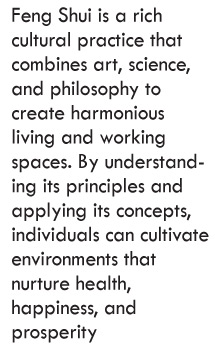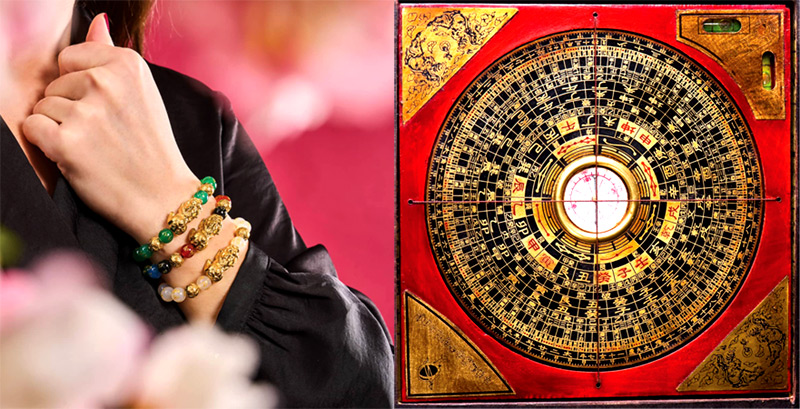Feng Shui, an ancient Chinese practice, is more than just a trend or spiritual superstition; it’s a profound philosophy rooted in the understanding of how our environment influences our lives. Literally translated as “wind” (feng) and “water” (shui), Feng Shui seeks to create harmony between people and their surroundings, promoting balance, health, and prosperity.
Origins
 Feng Shui dates back over 3,000 years, emerging from Taoist philosophy, which emphasises living in harmony with the natural world. Early practitioners used observations of nature and the cosmos to determine the best locations for building homes and communities. Over time, Feng Shui evolved into a complex system that integrates geography, architecture, and astrology.
Feng Shui dates back over 3,000 years, emerging from Taoist philosophy, which emphasises living in harmony with the natural world. Early practitioners used observations of nature and the cosmos to determine the best locations for building homes and communities. Over time, Feng Shui evolved into a complex system that integrates geography, architecture, and astrology.
Core principles
The practice is based on various principles and concepts that help guide individuals in arranging their living spaces. Here are some of the key elements:
1. Qi (Chi): Qi is the life force or energy that flows through everything in the universe. In Feng Shui, it’s believed that the flow of Qi in a space can affect the well-being of its inhabitants. A good Feng Shui arrangement promotes a balanced flow of Qi, leading to enhanced health and fortune.
2. The Five Elements: Feng Shui incorporates five elements — Wood, Fire, Earth, Metal, and Water — that interact and influence one another. Each element has its own associations, colours, and meanings. A balanced representation of these elements in a space can lead to harmony and well-being.
3. Bagua Map: The Bagua is a foundational tool in Feng Shui, used to map out a space’s energy flow. It divides a space into nine sections, each connected to different aspects of life, such as career, relationships, and health. By analysing which areas of the Bagua correspond to certain life aspects, practitioners can make informed design choices.
4. Yin and Yang: This concept reflects dualism in nature, embodying balance and harmony. In Feng Shui, it’s essential to balance the masculine (yang) and feminine (yin) energies in a space. Achieving this balance can enhance tranquility and promote positive energy flow.
Feng Shui in practice
Feng Shui can be applied in various ways, from home design to office layouts. Here are some practical tips for incorporating Feng Shui into your environment:
Declutter: A fundamental aspect of Feng Shui is to remove clutter, which can block the flow of Qi. Keep spaces organised and free of unnecessary items to promote a positive environment.
Natural Light and Air: Ensure that your space has ample natural light and ventilation. Open windows and use mirrors strategically to reflect light.
Positioning of Furniture: Arrange furniture to promote a welcoming atmosphere and allow smooth movement through space. For example, in the bedroom, position the bed in a commanding position, where you can see the door without being directly in line with it.
Colour and Decor: Use colours that align with the energies of the five elements to enhance specific areas of life represented in the Bagua. For example, blues and blacks represent water, fostering a sense of calm and depth.
Plants: Incorporate plants into your space to enhance the flow of Qi. They symbolize growth and vitality but choose plants that are easy to maintain and resonate positively with the space.
Cultural significance
In Chinese culture, Feng Shui plays a crucial role in rituals and life decisions, from choosing auspicious days for weddings to selecting the location for a new home or business. People consult Feng Shui experts to create harmony in their environments and improve their prospects for success.
Feng Shui is a rich cultural practice that combines art, science, and philosophy to create harmonious living and working spaces. By understanding its principles and applying its concepts, individuals can cultivate environments that nurture health, happiness, and prosperity. Whether you’re a believer in its mystical powers or simply looking to create a more balanced home, Feng Shui offers valuable insights into the impact of our surroundings on our lives. Embracing this ancient wisdom can lead to profound improvements in quality of life and well-being.









